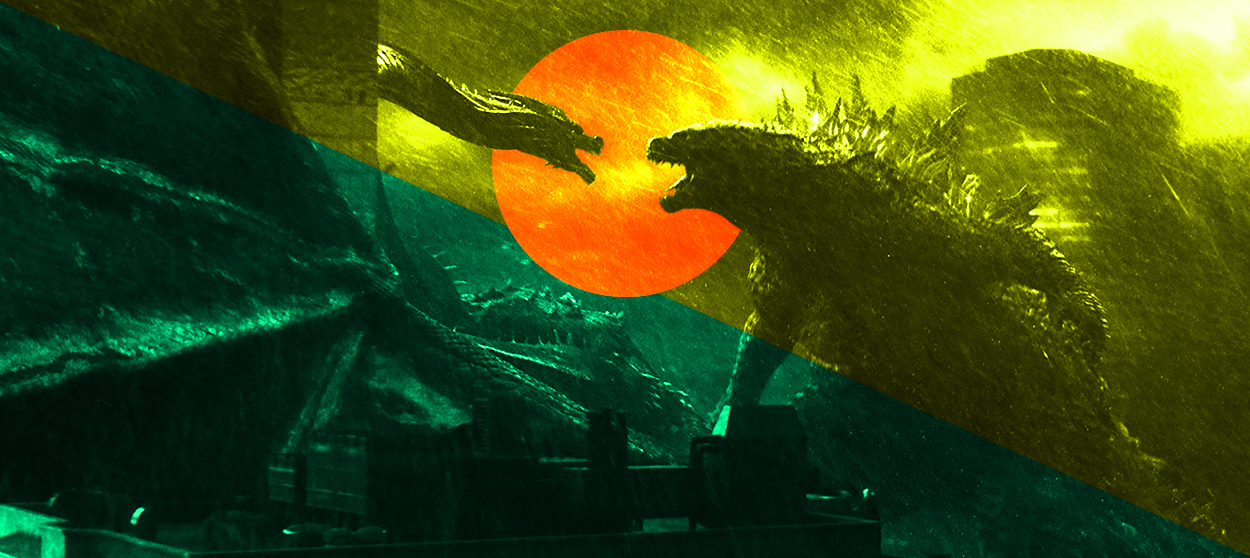Godzilla: King of the Monsters is an unlikely climate change movie
How the iconic monster evolved from antagonist to eco-hero


A free daily email with the biggest news stories of the day – and the best features from TheWeek.com
You are now subscribed
Your newsletter sign-up was successful
There's an ostensible comic relief moment in Michael Dougherty's Godzilla: King of the Monsters that accidentally recalls weather notices in today's headlines. "Bad news," declares a member of Monarch, the crypto-zoological agency formed to monitor the activity and habits of giant monsters around the globe. "You can just call it news," replies chief warrant officer Jackson Barnes (O'Shea Jackson Jr.) with a defeated pout. "It's always bad."
The reptilian colossus Godzilla was originally conceived by Tomoyuki Tanaka, Ishirō Honda, and Eiji Tsubaraya as a nuclear-powered bugbear; Honda's 1954 Godzilla film reflects Japan's acute fear of atomic obliteration, a shared cultural terror rooted in the Hiroshima and Nagasaki bombings on August 6, 1945. In the 65 years since Godzilla introduced the radioactive behemoth to the world, he has gradually evolved from antagonist to eco-hero. Where Honda's original film taps into Japan's national trauma to give form to nuclear devastation, Dougherty's film recalls America's present-day anxieties over increasingly intense weather patterns tearing across the country from coast to coast. Tornadoes are tearing across Indiana to Ohio; temperatures are rising to 100 degrees in Jacksonville, Atlanta, Savannah, Macon, all the way up to Charlottesville, a high for the season; parts of Nebraska, Oklahoma, Kansas, and Arkansas remain under flood watches. Last year, wildfires raged over northern California, taking a $3 billion toll on its inhabitants. Climate change, 2019's collective boogeyman, is the monster whose name everyone knows but whose existence not everyone accepts.
Godzilla: King of the Monsters couches climate change fears in egomaniacal ignorance. Alan Jonah (Charles Dance), an embittered ex-Britishy Army colonel and determined misanthrope, foolishly believes humans have set Earth on a collision course with extinction, and that freeing the "Titans" — including King Ghidorah, the three-headed alien dragon serving as the film's villain — will tip the scales in the planet's favor. He and his team of eco-terrorists seek out the hidden locations of slumbering behemoths, wake them up, and set them loose on the world. Enter Godzilla, cranky at being disturbed from his long rest — he's been MIA in the five years since the release of Gareth Edward's Godzilla — and ready to rumble. Jonah convinces Dr. Emma Russell (Vera Farmiga), one of Monarch's paleobiologists, of his perspective; the film proves them woefully offbase. Only Godzilla can tip those scales by kicking monster butt.
The Week
Escape your echo chamber. Get the facts behind the news, plus analysis from multiple perspectives.

Sign up for The Week's Free Newsletters
From our morning news briefing to a weekly Good News Newsletter, get the best of The Week delivered directly to your inbox.
From our morning news briefing to a weekly Good News Newsletter, get the best of The Week delivered directly to your inbox.
This continues the long-established characterization of Godzilla as a force of nature; when Earth's natural balance is thrown out of whack, Godzilla emerges from the depths to set things right by roasting foes with his atomic breath, incurring billions of dollars in property damage in the process. Of course, sending in a monster to contain a monster is an extreme answer to an extreme problem. A positive outcome still means countless lives lost, homes and businesses reduced to rubble and ash, and iconic baseball stadiums left smushed into pavement. When the ruckus ends and mankind's monster triumphs, the damage has already been done. It's hard to call that a victory. In its extravagant way, Godzilla: King of the Monsters, pleads for environmental stewardship: Jackson's "bad news" line isn't a throwaway but a sober acknowledgement. Weather reports are rarely good. In fact, they're usually dangerous.
Dougherty makes that environmental angst the film's throughline, fixating on the weather as both a plot point and an aesthetic. The characters, helpless to the Titans' whims, can only track the creatures' movements and warn others of their imminent arrival. When one monster first emerges in Mexico, a flap of his wings stirs up winds strong enough to send fleeing innocents careening through the streets; when King Ghidorah shows up, he brings a seething tropical storm with him. The monsters don't merely invoke memory of severe weather events; they are the weather events. Not one battle unfolds in clear conditions, and Dougherty uses the elements to advantage his action scenes: Ocean surfaces and cloud cover present opportunities for striking visual cues, Titans silhouetted by water and sky as they engage in epic contest. A literal climate change movie wouldn't be anywhere near this fun to watch. Catastrophe's so much more entertaining when wrought by kaiju.
The effect of Dougherty's filmmaking is to marry monsters of imagination with monsters of reality. Godzilla: King of the Monsters' climactic slugfest between Godzilla and King Ghidorah is heralded by advancing storm clouds and punctuated with blinding rains; expendable human characters are vaporized by Ghidorah's lightning strikes, and iconic Boston landmarks are flattened as he trades blows with Godzilla. It's a tragedy, but it's also the only way the planet can move forward and heal. As Dr. Ishirō Serizawa (Ken Watanabe), Monarch's highest ranking scientist, counsels ex-Monarch animal behavior specialist Mark Russell (Kyle Chandler), confronting one's demons means making peace with them.
We learn in an early recapping scene that Mark and his now-estranged wife, Emma, lost their son in the Edwards Godzilla movie; he's held a grudge against Godzilla ever since. By the time Godzilla: King of the Monsters reaches its finale, he's come around on the big guy and embraced his presence as necessary for Earth's survival. This world of monsters is the new normal. Mark adapts, as those of us living in the real world have to adapt to our own new normal. If we don't, the news will just keep on being news.
A free daily email with the biggest news stories of the day – and the best features from TheWeek.com
Bostonian culture journalist Andy Crump covers the movies, beer, music, and being a dad for way too many outlets, perhaps even yours: Paste Magazine, The Playlist, Mic, The Week, Hop Culture, and Inverse, plus others. You can follow him on Twitter and find his collected writing at his personal blog. He is composed of roughly 65 percent craft beer.
-
 The ‘ravenous’ demand for Cornish minerals
The ‘ravenous’ demand for Cornish mineralsUnder the Radar Growing need for critical minerals to power tech has intensified ‘appetite’ for lithium, which could be a ‘huge boon’ for local economy
-
 Why are election experts taking Trump’s midterm threats seriously?
Why are election experts taking Trump’s midterm threats seriously?IN THE SPOTLIGHT As the president muses about polling place deployments and a centralized electoral system aimed at one-party control, lawmakers are taking this administration at its word
-
 ‘Restaurateurs have become millionaires’
‘Restaurateurs have become millionaires’Instant Opinion Opinion, comment and editorials of the day
-
 Walter Isaacson's 'Elon Musk' can 'scarcely contain its subject'
Walter Isaacson's 'Elon Musk' can 'scarcely contain its subject'The latest biography on the elusive tech mogul is causing a stir among critics
-
 Welcome to the new TheWeek.com!
Welcome to the new TheWeek.com!The Explainer Please allow us to reintroduce ourselves
-
 The Oscars finale was a heartless disaster
The Oscars finale was a heartless disasterThe Explainer A calculated attempt at emotional manipulation goes very wrong
-
 Most awkward awards show ever?
Most awkward awards show ever?The Explainer The best, worst, and most shocking moments from a chaotic Golden Globes
-
 The possible silver lining to the Warner Bros. deal
The possible silver lining to the Warner Bros. dealThe Explainer Could what's terrible for theaters be good for creators?
-
 Jeffrey Wright is the new 'narrator voice'
Jeffrey Wright is the new 'narrator voice'The Explainer Move over, Sam Elliott and Morgan Freeman
-
 This week's literary events are the biggest award shows of 2020
This week's literary events are the biggest award shows of 2020feature So long, Oscar. Hello, Booker.
-
 What She Dies Tomorrow can teach us about our unshakable obsession with mortality
What She Dies Tomorrow can teach us about our unshakable obsession with mortalityThe Explainer This film isn't about the pandemic. But it can help viewers confront their fears about death.
